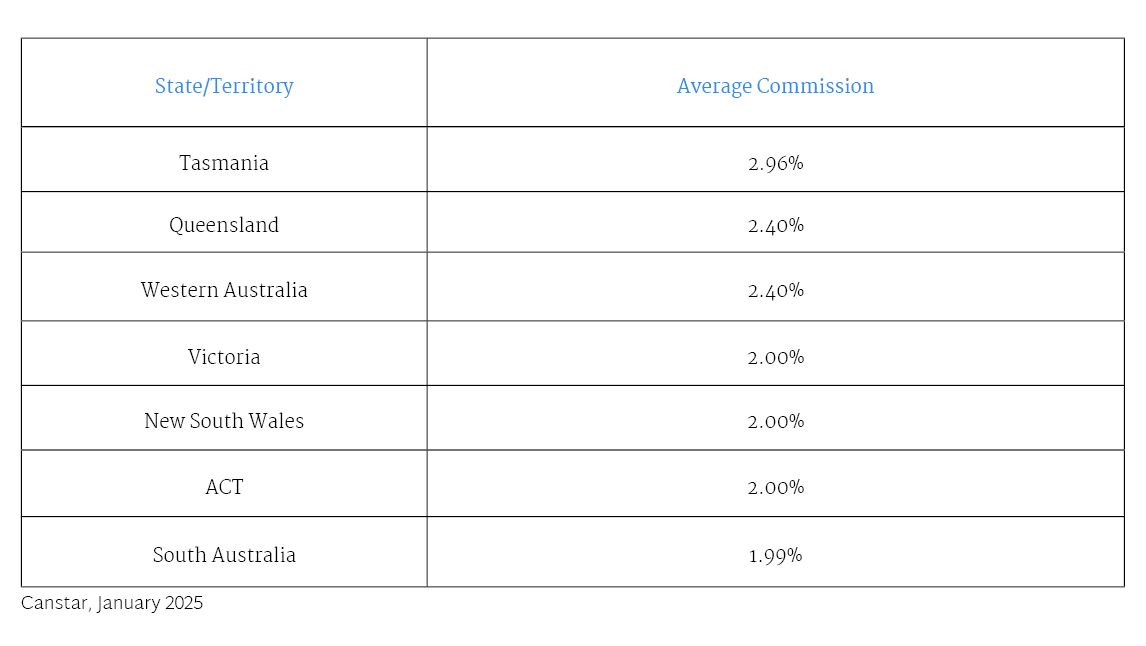
What is the average real estate commission?
A real estate agent commission is the fee you pay to a real estate agent for successfully selling your property. It covers the agent’s services, such as negotiations with buyers and managing the sales process. Typically, the amount payable is calculated as a percentage of the final sale price.
A skilled real estate agent who knows your neighbourhood well (and your target demographic even better) can help you get the best possible price for your home. Most agents are paid by way of commission, which means they’ll receive an agreed percentage of your sale price once your property is sold.
For example, if your agent charges 2.5% plus GST and your home sells for $1.2 million, you’ll pay the agent a commission of $33,000.
In this article, we take a look at the different commission structures and what you get for your money.
Fixed vs. tiered commissions – which is right for you?
Real estate agents in NSW use two main commission structures: fixed commission fees and tiered commissions.
Choosing between them largely comes down to how certain you want to be about the amount you will have to pay. Here’s an overview to help you decide which model works best for your sale.
Fixed commission fees
Fixed fee models can be either a fixed fee or a fixed percentage, and they are often selected by sellers because they provide a degree of financial certainty – i.e. you know how much commission you’ll be paying. They are also a good choice for lower-value homes.
• Fixed fee: With a fixed fee, an agreed dollar amount is set ($3,000, for example). No matter what the property sells for, that is how much commission you will pay.
• Fixed percentage: With fixed percentage commissions, a single rate (2%, for example) is applied to the entire contract price. This means that if a property is sold for $800,000, the commission payable to the real estate agent will be $16,000. This is the most common fee structure in Australia.
Tiered commissions
Some sellers want to incentivise the real estate agent to produce the best result possible by introducing a tiered commission rate. This essentially involves paying them a higher percentage of commission to reward the agent for achieving a sale price above expectations
A simple tiered commission fee might look like this:
- $0 to $1,000,000 = 1.8%
- $1,000,001 to $1,100,000 = 2%
- $1,100,001 to $1,200,000 = 2.2%
To find out more, talk to your local DiJones real estate agent.
Why do commissions vary between agencies?
The main goal of engaging an agent is to sell your home for the best possible price, so it can be confusing when agent commissions differ. However, there are some variables that help explain the differences.
The amount an agent charges might be influenced by:
- Where you live - Fees vary across the states and territories and even between inner-city and suburban areas.
- The number of agencies servicing your area - If agents have stiff competition to win business, they might lower their commission to attract listings.
- The value of your home - Because commission is a percentage of a property’s selling price, an agent will earn more by selling higher-priced homes. Some agents might agree to a lower commission for homes with a higher value.
- The agent’s experience and expertise in your market - If an agent is a top performer in your neighbourhood and regularly sells above market expectations, they might charge at the higher end of the commission scale.
Average real estate commission rates across Australia
Commission rates for real estate agents vary across Australia depending on your location, the property’s value, and the current market conditions. Commission rates typically range from 1.99% in South Australia to 2.96% in Tasmania.
Here’s an overview of average commission rates throughout Australia, depending on region.

What does a real estate agent commission cover?
For most of us, the aim of teaming up with an agent to sell our home is to achieve our desired sale price in as short a time frame as possible.
When you seek out a professional agency with a good reputation and high-performing agents, you can expect the following as part of the service:
Fine-tuned processes
There are a lot of steps involved when selling a house. It makes a world of difference if your agent knows exactly what to do and when to do it. This includes organising a sales contract, marketing materials, advertising and open homes. A good agent can most likely help connect you with other professionals you might need to complete your journey, such as brokers, solicitors/conveyancers, removalists, and cleaners.
Excellent communication
It is really important for the agent to keep the lines of communication throughout the entire sales campaign. You’ll want to hear about inquiry levels, feedback on your home, offers to purchase and new listings in your local market. It can be a good idea to let your agent know your preferred method of communication (text message, a phone call, an email) so they know how best to get hold of you, particularly when offers start to roll in.
A buyer database
Great agents have great databases and a well-managed list of high-intent buyers they can match with your home. Many of these buyers will be ‘qualified’, which means they are pre-approved for a mortgage or have cash in the bank ready to purchase a property. The more genuine buyers an agent can introduce to your property, the more competition is created, and competition is what pushes prices up.
Top negotiation skills
An agent who can squeeze every last dollar from a keen buyer is definitely worth having on your team. The ability to negotiate a high price for your property while remaining respectful to buyers is a skill that shouldn’t be underestimated. While you could negotiate the sale of your own property and avoid paying commission, there’s a strong chance you won’t achieve the best possible price.
The ability to perform in all market conditions
Every market travels through booms and downturns, but a good agent who understands your property’s unique appeal will be able to secure a sale regardless of market conditions.
Is real estate commission tax-deductible?
Can you claim paying real estate agent commission as a tax deduction? Possibly. It depends on the use of the property.
Homeowners
If you're selling your primary residence, the commission is not tax-deductible. However, it can be included in the property's cost base. This might potentially reduce any capital gains tax (CGT) if the property becomes subject to CGT in the future.
Investors
For investment properties, agent commissions might be considered capital expenses. In such a case, you possibly can add them to the property's cost base. Doing so may reduce the capital gain when calculating CGT upon sale.
For the most up-to-date information, it is a good idea to consult with a qualified tax professional. They can advise you on what is and is not tax-deductible. At the same time, they will also help you to remain compliant with the latest Australian Taxation Office (ATO) guidelines.
A final comment
Look at real estate agent commission as an investment. If you’re working with a highly-skilled, experienced professional, the commission will be offset by a smoother selling experience and top price for your property.
Are you ready to learn more? Reach out to our expert team today.
FAQs
How is real estate commission calculated?
Real estate commission is typically calculated in one of two ways. It can either be fixed as a price (i.e. $3,000) or as a percentage of the total sale price (3%, for example). Alternatively, it may follow a tiered commission structure that rises depending on the sale price achieved.
Can I negotiate the commission rate with my agent?
Yes. Agent fees and commission rates are not regulated in Australia. Therefore, it is common to negotiate based on the services offered and the local market.
What services are included in the commission fee?
The commission real estate agents charge usually covers property marketing, inspections, negotiations, and sales management. However, it is advisable to always clarify what’s included in real estate fees before committing to using their service.
Are there any additional costs besides the commission?
Yes. You can expect to incur advertising costs, auction fees, and legal fees. These are part of your total selling costs and are usually separate from the agent's commission.
Why do commission rates vary across agents?
Commission rates vary because different fees and commission structures, service levels, and level of experience can influence what a real estate agent charges.
Was this content helpful to you?






